- Home
- Jack Gantos
Jack's Black Book
Jack's Black Book Read online
THE JACK HENRY ADVENTURES
By Jack Gantos
Newbery Honor author of the Joey Pigza books
Jack Adrift: Fourth Grade without a Clue
Jack on the Tracks: Four Seasons of Fifth Grade
Heads or Tails: Stories from the Sixth Grade
Jack’s New Power: Stories from a Caribbean Year
Jack’s Black Book
The five books in the Jack Henry series are partly based on the diaries I (like Jack Henry) started keeping in elementary school. Some might think I have filled my alter ego’s world with oddball characters and strange situations, but to me the stories are mostly about the everyday stuff that went on in my family and in whatever nutty neighborhood we happened to be living at the time (we moved around a lot). I never thought I was special, because most of the kids I knew thought the world looked as loony and off-kilter as it did to me. Now, when I talk to kids about my family stories and neighborhood characters, they still give me that knowing look which says, “The world hasn’t changed that much.” Weird stuff still happens to kids, and around kids. Weird stuff is everywhere. An eleven-year-old reader summed it up. After reading one of the books in the series, she wrote to say she had recommended the book to her friends because “Your stories are filled with the unsaid things that go on inside kids’ brains.” Who could argue with that?
—J.G.
Copyright © 1997 by Jack Gantos
All rights reserved
Distributed in Canada by Douglas & McIntyre Publishing Group
Printed in the United States of America
First edition, 1997
Sunburst edition, 1999
15 14 13 12
Library of Congress Cataloging-in-Publication Data
Gantos, Jack.
Jack’s black book/Jack Gantos. — 1st ed.
p. cm.
Summary: Comic misadventures ensue when seventh-grader Jack tries to write the great American novel.
ISBN-13: 978-0-374-43716-9 (pbk.)
ISBN-10: 0-374-43716-5 (pbk.)
[1. Authorship—Fiction. 2. Humorous stories.] I. Title.
PZ7.G15334Jab 1997
[Fic]—dc21
96-53107
For Mabel Grace
Contents
PART ONE
Go Dog Go, or
How I Passed the Seventh Grade
PART TWO
The Blind Leading the Blind, or
Fish with Feet
PART THREE
The Fall of the House of Pagoda, or
The Tattooed Toe
One
It was pitch-black in my room and as I wrote I tried to imagine the size of each letter so I could keep the words in line and read what I had written in the light of morning. But no matter how carefully I wrote I knew my words would be jumbled and piled up over each other like train cars that had jumped the tracks. It didn’t matter if I could read the words or not. I knew what I was thinking when I wrote them. They were the same discouraging thoughts in the light of day or in the middle of the night. I had the words memorized from saying them to myself over and over again as I walked down the street, or opened a book, or tried to write. Moron. Idiot. Stupid. Two weeks earlier I had received my aptitude-test scores from school and since then I had been giving myself a hard time. Now I could feel myself reaching the end of my rope.
After another restless night I rolled out of bed and held the curtain to one side. It was just purple enough over the Teeters’ roof to know it was time to get ready for school. Pete was still asleep on his side of the room. I wanted to sneak over there and strangle him. The night before, he said it was a good thing I was brain dead because if I was ever in the army and captured, the enemy could torture me all they wanted and I’d still have nothing to confess.
I looked down at the floor. My personal diary was open to the page I had last written. It looked like the scratching of a madman just moments before he did something he could never take back. If I threw myself off the Inter-coastal bridge and drowned, everyone would think they knew why once they read what I’d been writing. They’d say things like, “Poor kid had low self-esteem.” Or, “He didn’t get enough positive reinforcement.” But they’d be missing the point. Calling myself an idiot wasn’t about receiving enough gold stars or pats on the head. This was about scientific proof that I was dumb. Slow. Dim. Mentally challenged. A born, biological, stone-cold loser.
Right next to my personal diary was my new writer’s journal. It was totally blank. Not a pencil scratch. Hardly a fingerprint. I bought the plain black book with unlined pages because I had decided to write a novel. I had made up my mind to become a writer, so I figured, why wait until I’m old? Write a novel now, make some money, and move from Fort Lauderdale to Paris or New York or Dublin, where all the famous writers live interesting lives. But I didn’t know how to write a novel. I didn’t know what my characters were like. I didn’t know the setting. I didn’t have a plot, or a theme, or even a beginning, middle, or end. I didn’t have a clue—yet. I was still waiting for a good idea to strike me. I had read in an old writers’ magazine that authors, when they were stuck, sometimes just needed to sit around in their bathrobes and stare dreamily up at the ceiling. Until, suddenly, an angel called a writer’s “muse” would descend and whisper inspirational ideas into their ears. Then bingo, their pens begin to move across the pages like the pointer on a Ouija board. But the more I stared at the cracks in my ceiling while dressed in a terry-cloth bathrobe, sucking on my lead pencil point with my ears perked up like a Chihuahua’s, the only ideas that rolled around my empty head were ugly. Give up. Throw in the towel. You don’t have what it takes to write a novel. My stupidity was stalking me like some big dumb monster with a club. Every time I thought I was smart enough to write, WHAM, I’d get smacked across the side of the head. And the more I whaled on myself, the dumber I felt, and the more it paralyzed me. I hadn’t written the first word, but I hadn’t given up hope.
What encouraged me to stick with writing was this one weird thing: whenever I closed my eyes, the letters of the alphabet shifted around like Scrabble pieces and formed words. Those words lined up and soon I imagined entire pages of writing so clearly that I could actually read them, sentence after sentence, as if I were reading straight from a book. A book I had written, with my name on the cover and my stories inside. I could feel the weight of that book in my open hands and inhale the clean smell of ink and paper when I stuck my nose between the pages. I could imagine looking through a bookshop window and seeing a stack of my books on display. “Yes,” I’d hiss. “The idiot did it! The moron has triumphed! Those are mine.” And I’d be so dizzy with pride I’d stumble down the road as weak-kneed as a drunk. But even though I could see the book with my eyes closed, as soon as I opened them the words vanished. I knew those words were in me, I just had to squeeze them out.
I preferred getting up early in the morning since it was the only time I had the house to myself. I put on my old blue private-school pants which were now too tight because I was having a growth spurt. I yanked a white T-shirt down over my head and slipped into Dad’s old mud-stained loafers. Mom had given up on dressing me as a catalogue cover boy for Sears, so I dressed myself to look like a combination mental-health outpatient and day laborer so I’d blend in with the tough local kids. I ran my fingers through my hair as I walked down the hall, past Betsy’s room, and into the kitchen. BeauBeau III was sleeping in front of the refrigerator door like some bridge troll trying to collect a fee each time it was opened. I gave him a little kick in the rear. “Come on,” I whispered, “time to make the donuts.” He hopped up and began to stretch. His fleas stretched. His worms stretched. His ticks stretched. Everything but his brain stretched. He was a mess. I figured
if I were a dog I’d be just like him.
I pulled out the carton of milk, flipped open the spout, and held it to my mouth. I loved ice-cold milk and took a long drink, swallowed, and drank some more before I began to gag. I dropped to my knees and spit up a clot of sour milk onto the kitchen floor. It jiggled about like a white cube of coagulated Jell-O. Fortunately, BeauBeau III was hungry, and before I could clean the floor he lapped up what I had spit out. Who’s the bigger idiot? I wondered. Me or BeauBeau III? I didn’t know the answer just yet, but he was definitely my main competition, and I figured we were running neck and neck in the Bonehead Sweepstakes.
BeauBeau III was Betsy’s new dog. Last year, when we all lived in Barbados, Betsy had decided she was going to go to boarding school in London. When we left the island she stayed behind, packed and ready to go. But her plans didn’t work out and she grudgingly returned from Barbados to join us back in Fort Lauderdale. She called Florida “the hairy armpit of the world” and was so depressed Mom let her pick out a pet in an effort to lift her spirits. One afternoon she returned from the Animal Rescue League with an already grown cocker spaniel, and just like BoBo I, who’d been eaten by an alligator in a canal near our old house in Fort Lauderdale, and BoBo II, who we had to leave behind in Barbados, this one had no trace of a brain. Betsy was now studying French and she had named him BeauBeau III. The prissy French name didn’t make him any smarter. Betsy could educate his palate with all the French food she wanted—French bread, French fries, French toast, and French dip—she could dress him up in a beret, knot a scarf around his neck, and spray him with French perfume, yet he’d still be nothing more than a common American BoBo who cuts loose with paralyzing nerve gas during dinner, pees down his own leg when excited, eats palmetto bugs, and laps up Eric’s baby vomit. But I loved him. He was my soul mate, my double, and was fast becoming my mentor. I was dumb and miserable, and I looked to him to teach me how to be dumb and happy. So far, I wasn’t doing too well.
As I ran a sponge over the sticky spot on the floor, BeauBeau licked at my hand. His breath almost blistered my skin. “You’re revolting,” I said, turning my nose away from him. “Go outside and dig a hole.”
He didn’t need my permission. He squeezed his way through the cat-size rubber pet-door and into the backyard. Digging holes was his obsession. He had dug so many our yard looked like a World War I battlefield. And he dug the deepest holes of any dog I’d ever seen. He could work his entire body below the surface and as he tunneled toward the center of the earth the dirt sprayed up and formed a mound to one side. In his former life he must have been a grave robber who’d been punished when he died by being reincarnated as a dumb dog.
I brushed my teeth, washed my face, and, since I was already dressed, sprayed deodorant on the outside of my shirt. I grabbed my black book from the bedroom floor and shoved it into my backpack. I carried it with me at all times just in case my muse decided to pay a visit while I was on the bus, or trying to figure out how to open my combination lock at school. A muse could strike at any time, the old writers’ magazine had stressed, “even while one was engaged in personal hygiene.” I wanted to be prepared.
I had just slung the backpack over my shoulder and was tiptoeing down the hallway when Betsy cracked open her bedroom door.
“Have a nice day, BeauBeau the fourth,” she sang. She had been calling me that ever since I announced the results of my school aptitude tests at the dinner table. That was a colossal mistake. Telling my family that I was dumb was even more proof that I really was dumb. If I was even a little bit smart, I would have kept my mouth shut.
I faked a lunge at Betsy and growled. I had already pulled the pins out of her door hinges—my favorite trick—and was praying she might yank the door open a little farther so it would fall back and flatten her. But she held her ground and glared at me.
“Make sure your address is sewn inside your pocket in case you get lost,” Betsy advised.
I wanted to scream out, “I’m not an idiot! Leave me alone!” But if I woke the baby Mom would get involved in a bad way. So I just sucked it up, took a deep breath, and thought I’d sew some other family’s address labels on me, get lost, and be sent to a home full of nice people. And I’d take BeauBeau III with me, too.
Even when my family was trying to be thoughtful toward me, it hurt. The day before, I’d found a package of alphabet flash cards that Pete hid in my backpack. After I got him in a headlock and had BeauBeau lick his face, he said he was just trying to help educate me. And for the last two weeks Mom cooked me fish sticks for dinner because she said fish was “brain food.”
Dad was the only one who didn’t seem to mind that I was dumb. He said that if I was going to work with my hands for the rest of my life brains would just get in the way. He had taken a new job at a concrete factory and said I could always work in the warehouse as the rat exterminator. “You just take a broom handle and pound a rusty nail through the end. And when you see a rat chewing a bag of “crete you just stab him through the brain.” The thought of rat juice squirting out of a punctured brain gave me nightmares.
I continued down the hall and slipped out the front door before anyone else woke up and gave me a hard time. As I walked down the sidewalk toward the bus stop, BeauBeau was already deep into a hole. I could just see his tail wagging and a fan of dirt overhead.
“Go, BeauBeau, go,” I hollered. “Dig a hole to France and we’ll visit your relatives.” He hopped out of the hole and shook the dirt from his coat. I peeled the wrapper off a Slim Jim I had saved for lunch, took a bite, and threw the rest in his direction. He snapped it out of the air and swallowed it whole. “See you later, buddy,” I said. He barked and went back to work.
Two
I began to call myself insulting loser names shortly after I was sent to Sunrise Junior High. It was known as a tough school, full of kids with low potential and no plans for the future. Gary Pagoda had gone there until he failed three years in a row and dropped out. He had already been a veteran juvenile delinquent by seventh grade, and even he swore it was dangerous. He called it a school for the “criminally insane.” So I had figured it was like a prison filled with hardened convicts with swastikas tattooed onto their foreheads and homemade knives strapped inside their motorcycle boots. That was only a guess.
What really shocked me was when I found out how true my guess had been. After I had been at Sunrise for a few weeks I’d heard all about the school’s peculiar history. Before it was a school, Sunrise Junior High had been Sunrise State Detention Center. When Florida still had chain gangs working to pick up trash and cut weeds on the side of highways, the criminals had been housed in the same rooms where I now studied English, math, science, and wood shop.
This made a lot of sense when I looked at the school’s architecture. The double rows of twenty-foot-high chain-link fences were topped with rusty barbed wire that over the years had snagged a lot of plastic grocery bags. When the wind picked up, the bags snapped back and forth and sounded just like the tough girls smacking their gum as they lined up outside the phone booth. There were steel gates that led into the school, two in the front and two in the back. The stone towers sticking up at every corner had been guard shacks where trained snipers could pick off any escapees. Now one tower was used as a science and weather station, another as a “Time Out” zone for hyperactive bullies, one as the DARE office, and the other as headquarters for the Latin Club. I guessed they were the only club that got a tower because the few token smart kids needed to barricade themselves in from the illiterate Huns all day.
The more I poked around the school, the more evidence I found of the old prison. About every fifty feet down each corridor, there were swinging metal doors with bullet-proof glass panels. Broken security cameras mounted on steel poles were everywhere, inside and outside. There were thick bars over all the classroom windows. But the strangest thing about Sunrise was the wood and sheet-metal machine shop where prisoners had made institutional furniture, license plates
, military dog tags, and other stuff no one else would make unless they were in prison. It was the size of a football stadium. This was why Sunrise was a magnet school for vocational training in shop. Kids—mostly guys—from all over Fort Lauderdale were bused to our school just to make benches, picture frames, jewelry boxes, letter openers, salad sets, bedside tables, baseball bats, and other stuff they sold in a little gift store next to the Department of Social Services office, which was next to the principal’s office.
There was only one way to escape from Sunrise aside from tunneling under the fences. You had to test your way out of the school. You had to prove you were smart enough to be sent to a magnet school for the arts or sciences, or a school with a college-preparatory curriculum. And so I had signed up for the tests, figuring I’d be transferred out of there in no time.
Mr. Ploof was the Guidance Counselor. One Monday, as arranged, I went into his small office, which had probably been a padded isolation cell. He had prepared a battery of tests for me.
“Are you ready to exercise your mental muscle?” he asked, and pointed to his own hydrocéphalie cranium, which was as hairless and white as the belly on a watermelon.
“I can’t wait,” I replied. “I’ve been thinking about this all night long.”
“Should have just got some sleep,” he remarked. “‘Cause you’re in for a long day.”
He started out by timing how fast I could stack a hundred small washers onto a thin metal rod. I didn’t even turn my brain on for that one. Instead, I daydreamed about my future. I figured in about a week I’d be in a school where the teachers actually helped students to write books. All day we’d read stacks of great novels and discuss them inside and out until we knew everything about how they were written. Then we’d write and rewrite our own books until we sent them off to be published.
Afterward Mr. Ploof gave me a tray of fifty assorted nuts and bolts and I had to fit the proper nuts to the proper bolts as quickly as possible. It was a breeze.

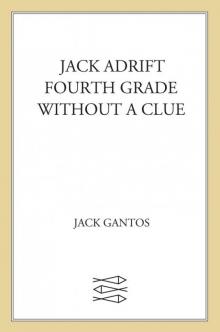 Jack Adrift
Jack Adrift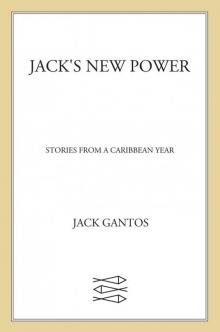 Jack's New Power
Jack's New Power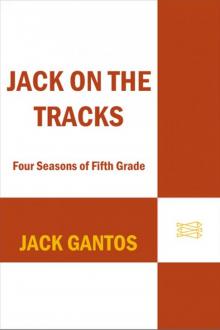 Jack on the Tracks
Jack on the Tracks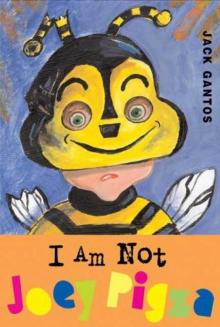 I Am Not Joey Pigza
I Am Not Joey Pigza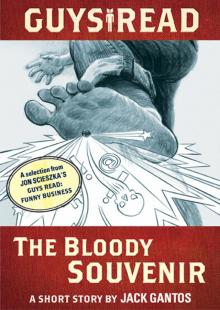 The Bloody Souvenir
The Bloody Souvenir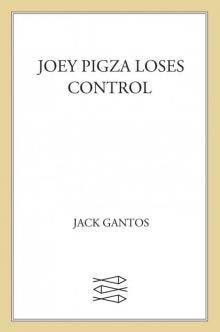 Joey Pigza Loses Control
Joey Pigza Loses Control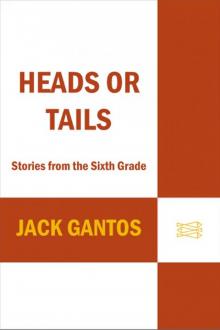 Heads or Tails
Heads or Tails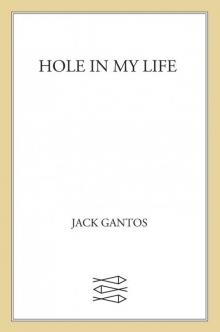 Hole in My Life
Hole in My Life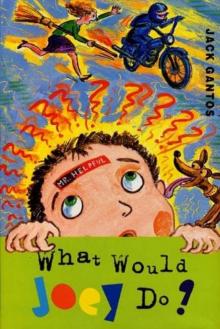 What Would Joey Do?
What Would Joey Do?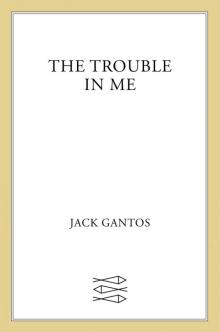 The Trouble in Me
The Trouble in Me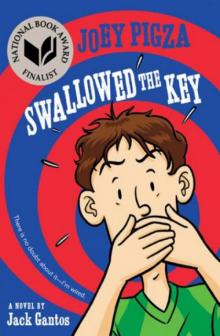 Joey Pigza Swallowed the Key
Joey Pigza Swallowed the Key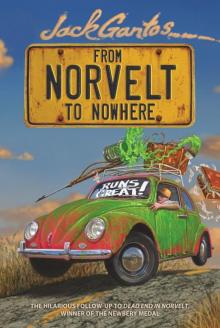 From Norvelt to Nowhere (Norvelt Series)
From Norvelt to Nowhere (Norvelt Series)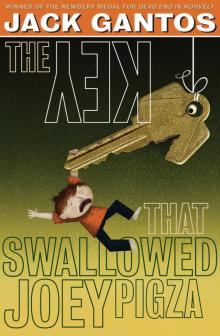 The Key That Swallowed Joey Pigza
The Key That Swallowed Joey Pigza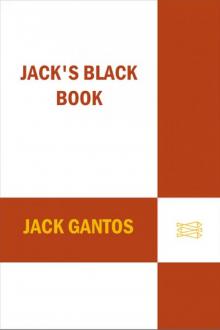 Jack's Black Book
Jack's Black Book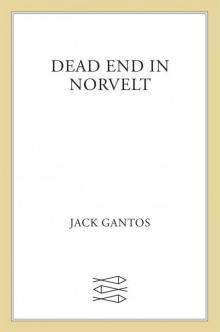 Dead End in Norvelt
Dead End in Norvelt